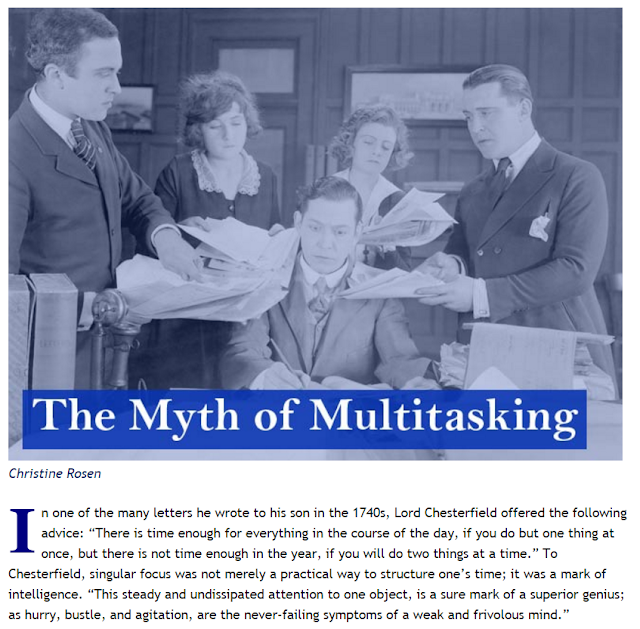Media Multitasking
It seems that everyone tends to multitask nowadays especially with smart phones. Even young kids are now claiming that they are capable of attending to more than one activity at the same time. Of course, our cognitive functions are really limited that oftentimes what we think is multitasking is actually switching between tasks. Thus, there is concern that performance is compromised as we keep trying to do more than one thing at a time. In addition, there is a worry that multitasking may actually degrade one's cognitive skills. Well, there is a study that now points out that media multitasking is most probably not a cause but a result of poor executive function ability.
The study, Media Multitasking in Adolescence, published in the journal Psychonomic Bulletin & Review, looks at more than 70 eight grade students to see if there is a relationship between media multitasking and the following cognitive and behavioral measures:
The study, Media Multitasking in Adolescence, published in the journal Psychonomic Bulletin & Review, looks at more than 70 eight grade students to see if there is a relationship between media multitasking and the following cognitive and behavioral measures:
- MCAS Math
- MCAS English
- Count span
- N-back
- Filtering
- Comprehension
- Vocabulary
- Calculation
- Growth mindset
- Grit
- Conscientiousness
- DSIS-C (impulsivity)
- Processing speed
- Pegboard (dexterity)
Media multitasking is indeed found correlated with poorer scores in the Math and English tests. Multitasking is also associated with poorer executive function ability and working memory. Adolescents who watch more than one medium at a time are also more impulsive and are less likely to have a growth mindset. However, these relationships apparently do not apply to other kinds of cognitive or perceptual–motor performance or other personality measures.
What is surprising is that ironically, those who tend to multitask are those who should not be multitasking since they have poor self-control and working memory. It appears then that multitasking does not influence behavior, but in fact, is a result of a person's poor executive function. Multitasking appears to be simply a manifestation of a person's poor self-control. Multitasking is not associated with intelligence, thus, the negative correlation seen between media multitasking and test scores is most probably due to both multitasking and poor test performance originating from the same cause, poor executive function ability.
Back in 2008, Christine Rosen of the The New Atlantis, reminded us of Lord Chesterfield's words:
“There is time enough for everything in the course of the day, if you do but one thing at once, but there is not time enough in the year, if you will do two things at a time. This steady and undissipated attention to one object, is a sure mark of a superior genius; as hurry, bustle, and agitation, are the never-failing symptoms of a weak and frivolous mind.”
Multitasking does not make us dull. It is a symptom of our lack of self-control.
 |
| Above copied from the New Atlantis |
Comments
Post a Comment